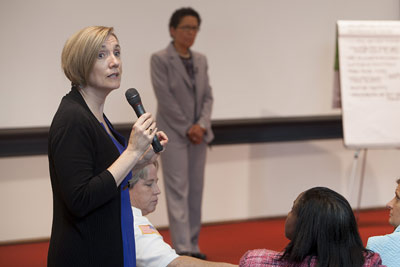Forum focuses on preventing sexual violence and bias-related incidents
By Nancy Doolittle

At a community forum on campus Sept. 24, senior administrators committed to developing concrete actions to help end all forms of violence at Cornell, including sexual assault, harassment and hate crimes.
The discussion among more than 60 students, faculty, staff and administrators focused on the need to develop greater awareness among all members of the Cornell community of conditions that perpetuate sexual violence, as well as suggestions for actions that can be taken to help prevent sexual assault. Some of these suggestions had already been submitted to the university earlier in the spring and last week at a meeting Sept. 21 between student protesters and President David Skorton; Susan Murphy '73, Ph.D. '94, vice president for student and academic services; and Mary Opperman, vice president for human resources and safety services.
"What outcomes would you like to see today?" asked Renee Alexander, associate dean of students and director of intercultural programs, who facilitated the forum. Better communication, various students said, and more transparency in how the Cornell administration deals with sexual violence and bias-related incidents as well as its efforts to change the broader cultural context to prevent these incidents. Students also asked for greater clarity around follow-up processes after an incident has occurred, as well as outreach and education, with more input from students, faculty and staff so programs meet the needs of all. Related issues concerning people of color, the LGBT community and the Greek system were also raised.
Opportunities for discussion
A working group has been formed to focus on creating and implementing solutions to the challenges around sexual assault and sexual violence in the Cornell community. It was organized by the Office for Workforce Diversity and Inclusion and the Women's Resource Center, and will hold its first meeting Sept. 28, 12:45-2 p.m., in G-01 Biotechnology Building. Anyone interested in being part of that working group is invited to attend.
Also upcoming: an open town hall, "Maintaining Community in the Face of Bias -- Interactive Workshop and Open Forum," facilitated by A.T. Miller, associate vice provost for academic diversity initiatives, will be held Oct. 12, 12:30-2 p.m. in G10 Biotechnology Building.
Victims and observers of harassment or violence need to know how to readily access Cornell's many resources, one student said, including who to call for help, and what to expect afterward. A poster campaign at campus and Greek residences, similar to the medical amnesty education campaign, was suggested. More education for all students, better publicity and outreach about forums and other opportunities for dialogue, and training of faculty, staff and student group leaders were recommended.
One student noted that the crime alert emails, while important, do not address underlying problems. Chief of Police Kathy Zoner said that the alerts are regulated by law and intended to guide members of the community in taking steps to keep themselves safe. They are part of the university's commitment to transparency, she said.
Mary Beth Grant, judicial administrator, outlined such resources available to victims as the Cornell Police, the Judicial Administrator's Office and Gannett Health Services, which offers confidential counseling.
Alan Mittman, director of workforce policy and labor relations, noted that a poster on sexual harassment, needs broader dissemination. It was also noted that a new poster, designed and developed by students, "C Is for Consent," will be distributed across campus in the coming weeks.
And Sarah Jones, assistant dean of students for new student programs, said that she has been working with campus experts and students to develop formal programming about sexual violence prevention for new students. She noted that a performance-based presentation by sexual assault educators, "Speak About It," which specifically addresses such issues as consent, healthy relationships, bystander intervention and sexual assault prevention, has been successful at a number of college campuses. A program such as this one could be implemented in the future, with the input of students, staff and faculty, she said.
Students closed the discussion by exploring various ways in which information from the forum could be disseminated and their suggestions implemented, with Dean of Students Kent Hubbell promising that the dialogue would continue. "We want to see results as soon as we can," he said.
"I would like to see us get further along in our discussion of how to address and change a culture of rape," said Alexander after the meeting. "These students are engaged, the student leaders are engaged, and many of the members of the Greek system are engaged in dealing with these large issues."
Media Contact
Get Cornell news delivered right to your inbox.
Subscribe